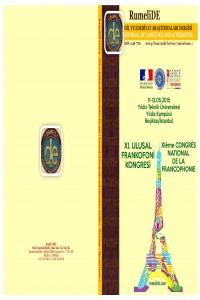A Phenomenological Outlook On The Relationship Between Me And The Other In The Novels The Adversary And The Prisonner
Abstract
The
relationship between Me and the Other is a subject which has been
examined throughout the history of ideas in many aspects particularly social,
political and legal. While “Me” was previously considered as
the center of the thoughts on the subject, the concept “Other” has become
a subject of study itself in philosophical and literary field, especially since
the nineteenth century, owing to Hegel's Master-Slave Dialectic. The studies on
relationship between Me and the Other have been intensified with
the emergence of the phenomenological method in the early part of
the 20th century. Phenomenology
studies the “phenomena”: appearances of things, of realities in our experience,
the way in which they appear directly in acts of consciousness. Through this
method, many philosophers have taken in hand the
relationship between Me and the Other via concepts
such as “sameness/otherness”, “immanence/ transcendence”, “perception
/ sensation”. The purpose of this study is to examine the relationship between
Me and the Other in two novels of French Literature: Marcel
Proust’s The Prisoner and Emmanuel
Carrère's The Adversary, through the
thoughts of Husserl and Merleau-Ponty who
are two important philosophers of phenomenological
thinking. In this regard, we
studied how the protagonists affect each other in the discourse of novels, how
“Me”, in other words the “Subject” perceives himself and the Other in this
relationship and how he tries to approach to the Other. In this study, we
aim to clarify how the relationship between Me and the Other was
constructed in the discourse of novels by means of phenomenological concepts of
Husserl and Merleau-Ponty such as consciousness, perception, sensation and body.
Keywords
References
- Carrère, E. (2000). Rakip. İstanbul: Doğan.
- Husserl, E. (1953). Méditations cartésiennes. Introduction à la phénoménologie. Traduit de l’allemand par Gabrielle
- Peiffer et Emmanuel Levinas. Paris: Librairie Philosophique J. Vrin.
- Merleau-Ponty, M. (1945). La phénoménologie de la perception. Paris: Gallimard.
- Merleau-Ponty, M. (2002). Causeries (entretiens radiophoniques de 1948). Paris: Le seuil.
- Proust, M. (2008). Mahpus. İstanbul: Yapı Kredi.
Abstract
Ben
ve Öteki ilişkisi düşünce tarihi boyunca başta sosyal, siyasi, hukuki olmak
üzere birçok boyutta incelenen bir konudur. Önceleri konuyla ilgili
düşüncelerin merkezini “Ben” kavramı oluştururken, özellikle 19. yüzyıldan
itibaren Hegel’in Köle - Efendi diyalektiğiyle birlikte “Öteki” kavramı felsefi
ve edebi alanda başlı başına bir inceleme konusu haline gelmiştir. 20. yüzyılın başında ortaya çıkan fenomenoloji (görüngübilim)
yöntemiyle birlikte Ben ve Öteki konusuyla ilgili çalışmalar da yoğunlaşmıştır.
Fenomenleri yani kişinin bilincinde dolaysız olarak oluşan olgu ve olayları
oluşum süreçleriyle birlikte inceleyen fenomenolojik yöntem aracılığıyla,
birçok düşünür Ben ve Öteki ilişkisini aynılık/ötekilik, içkinlik/aşkınlık,
algı/duyumsama gibi kavramlar üzerinden ele almıştır.
Çalışmamızda, Fransız edebiyatından seçtiğimiz iki
eser olan Emmanuel Carrère’in “Rakip” ve Marcel Proust’un “Mahpus” adlı
romanlarındaki Ben ve Öteki ilişkisini fenomenolojik akımın önemli iki ismi
olan Edmund Husserl ve Maurice Merleau-Ponty’nin konuyla ilgili yaklaşımları
doğrultusunda incelemeye çalıştık. Bu amaçla romanlardaki kahramanların
birbirlerini karşılıklı olarak nasıl etkiledikleri, Ben’in, diğer bir deyişle
Özne’nin bu ilişkide kendini ve Öteki’ni nasıl algıladığı, Öteki’ne nasıl
ulaşmaya çalıştığı gibi sorunsallar üzerinde durduk. Husserl ve
Merleau-Ponty’nin bilinç, algı, duyumsama ve beden gibi kavramlar üzerinden
önerdikleri kuramlardan yola çıkarak ele aldığımız romanların söyleminde Ben ve
Öteki ilişkisinin nasıl oluştuğunu incelemeyi amaçlamaktayız.
Keywords
References
- Carrère, E. (2000). Rakip. İstanbul: Doğan.
- Husserl, E. (1953). Méditations cartésiennes. Introduction à la phénoménologie. Traduit de l’allemand par Gabrielle
- Peiffer et Emmanuel Levinas. Paris: Librairie Philosophique J. Vrin.
- Merleau-Ponty, M. (1945). La phénoménologie de la perception. Paris: Gallimard.
- Merleau-Ponty, M. (2002). Causeries (entretiens radiophoniques de 1948). Paris: Le seuil.
- Proust, M. (2008). Mahpus. İstanbul: Yapı Kredi.
Details
| Journal Section | Turkish language, culture and literature |
|---|---|
| Authors | |
| Publication Date | April 21, 2016 |
| Published in Issue | Year 2016 Issue: 4 |


